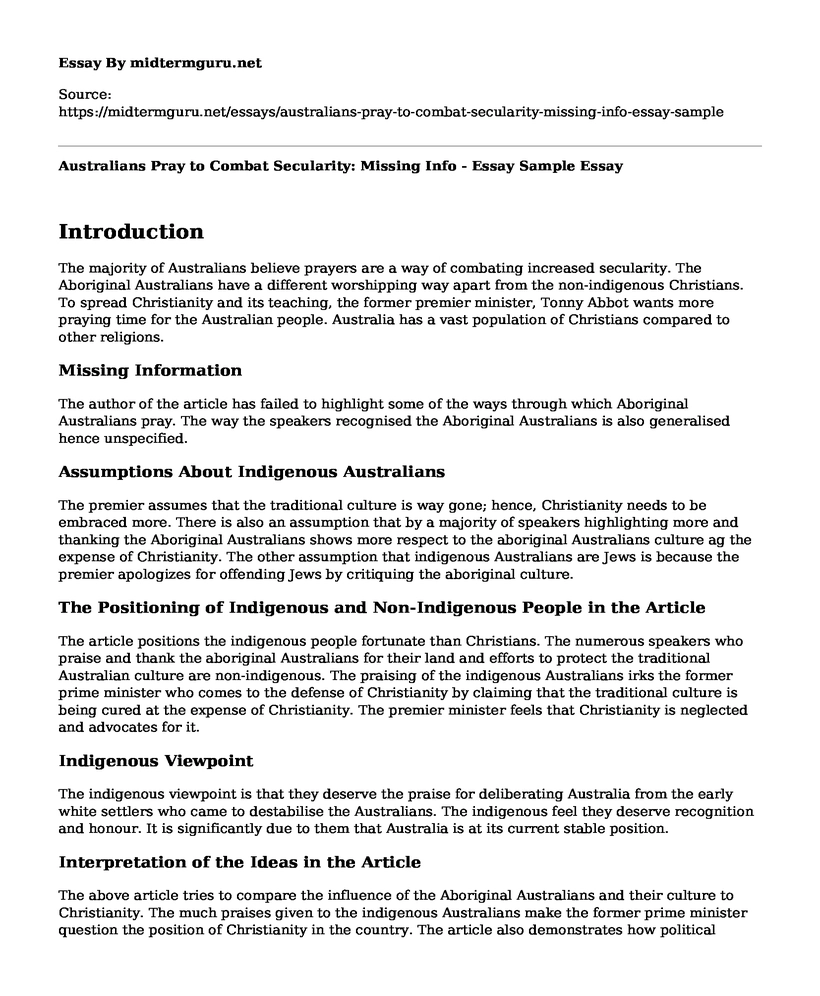Introduction
The majority of Australians believe prayers are a way of combating increased secularity. The Aboriginal Australians have a different worshipping way apart from the non-indigenous Christians. To spread Christianity and its teaching, the former premier minister, Tonny Abbot wants more praying time for the Australian people. Australia has a vast population of Christians compared to other religions.
Missing Information
The author of the article has failed to highlight some of the ways through which Aboriginal Australians pray. The way the speakers recognised the Aboriginal Australians is also generalised hence unspecified.
Assumptions About Indigenous Australians
The premier assumes that the traditional culture is way gone; hence, Christianity needs to be embraced more. There is also an assumption that by a majority of speakers highlighting more and thanking the Aboriginal Australians shows more respect to the aboriginal Australians culture ag the expense of Christianity. The other assumption that indigenous Australians are Jews is because the premier apologizes for offending Jews by critiquing the aboriginal culture.
The Positioning of Indigenous and Non-Indigenous People in the Article
The article positions the indigenous people fortunate than Christians. The numerous speakers who praise and thank the aboriginal Australians for their land and efforts to protect the traditional Australian culture are non-indigenous. The praising of the indigenous Australians irks the former prime minister who comes to the defense of Christianity by claiming that the traditional culture is being cured at the expense of Christianity. The premier minister feels that Christianity is neglected and advocates for it.
Indigenous Viewpoint
The indigenous viewpoint is that they deserve the praise for deliberating Australia from the early white settlers who came to destabilise the Australians. The indigenous feel they deserve recognition and honour. It is significantly due to them that Australia is at its current stable position.
Interpretation of the Ideas in the Article
The above article tries to compare the influence of the Aboriginal Australians and their culture to Christianity. The much praises given to the indigenous Australians make the former prime minister question the position of Christianity in the country. The article also demonstrates how political correctness may destroy the future of Australian young people.
"Remember Indigenous Australian on January 26"
Knowledge of Australian history
Indigenous Australians were primarily active in Australia during the 20th and 21st centuries. The indigenous Australians formed the Australian Aboriginal Sovereignty, which was a political forum for the indigenous Australians to demand control of the primary parts of Australia. Aboriginal Sovereignty is yet to be acknowledged by the legal administration. The author uniquely discusses the ambiguity in the Australian legal system, celebrating the date when the first white people invaded the Australian displacing them brutally and fail to recognise the indigenous Australians.
Missing Information
The author has categorically critiqued the failure of the federal government to recognise the indigenous Australians. The primary data missing is the author's failure to mention the specific heads such as Neville Bonner and Albert Namatjira that spearheaded the indigenous Australians' freedom from the early white settlers. The author has also limited the journal on proposing January 26 to be the aboriginal Australians day without giving detailed information on why he specifically selected the date.
Assumptions About Indigenous Australians
The readers have a hypothesis that indigenous Australians have to behave in a specific way for an individual to be recognised as indigenous. Indigenous Australians are also presumed to be alcoholics and violent. There is also an assumption that the indigenous people are dysfunctional, live in remote areas, or are exceptional athletes.
The Positioning of Indigenous and Non-Indigenous People in the Article
The author positions the indigenous people to be responsible where they are likely to stay out of their parents' house at an early age compared to the non-indigenous. The author also brings out the idea of indigenous people being violent. The author states that indigenous Australians are likely to be in prison or under correctional supervision, unlike the non-indigenous.
Indigenous Viewpoint
Yes, there is an indigenous viewpoint in the article. The indigenous Australians have expressed their frustrations in celebrating the darkest day in their history where they were invaded by the early whites. The indigenous also express their difficulties in forgetting their extended stay in Australia, hence the demand for a change of the national day.
Interpretation of the Ideas in the Article
The indigenous readers of the report could interpret the non-indigenous people of being weal and dependent. Non-indigenous people are likely to understand indigenous people as violent. The indigenous can also be thought to be independent.
Conclusion
The two articles have contrasted thee modern Australia to the indigenous people. The cultural supremacist is highlighted when the premier highlights the need for Christianity than traditional culture. Assumptions are also made about the indigenous people hence making them have common identification characteristics.
Cite this page
Australians Pray to Combat Secularity: Missing Info - Essay Sample. (2023, Jan 31). Retrieved from https://midtermguru.com/essays/australians-pray-to-combat-secularity-missing-info-essay-sample
If you are the original author of this essay and no longer wish to have it published on the midtermguru.com website, please click below to request its removal:
- Discussion Questions on Augustines Confessions - Paper Example
- Essay Sample About the God Zeus
- Research Paper on Communication of Different Cultures
- Essay Sample on Race, Sexuality, and Fantasy
- Discussion: Free Speech and Social Networking
- Critical Essay on Buchi Emecheta's Second Class Citizen
- Effective Communication: Key to Successful Teaching & Learning - Essay Sample







